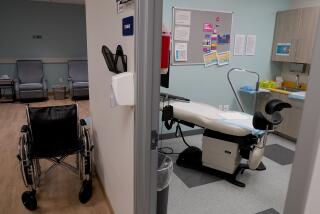Head Start on a Healthy Pregnancy : If you’re thinking of having a baby, you should be watching your health right now. Some doctors say ‘preconception care’ can help avoid later problems.
- Share via
Lynda had tried to become pregnant for almost a year. But, discouraged by months of infertility, she was not taking the best care of herself. She had a few drinks at a party. She used a hot tub. She took antihistamines for a cold.
Ordinarily, none of these things would be considered unhealthy. But they happened in the first few weeks of Lynda’s pregnancy, before she realized she was pregnant.
Although she gave birth to a healthy child, Lynda spent much of her pregnancy chastising herself and worrying.
“I feel lucky that my baby is all right,” says the Orange County woman, who asked that her real name not be used. “I feel very foolish about what happened. I was embarrassed to tell my doctor about the risks I had taken early in my pregnancy, but I had to tell him.”
Every obstetrician has heard similar stories, since many pregnant women don’t see their doctors until the eighth week. And sometimes, the outcome is not so fortunate. That’s why a small number of obstetricians are advocating a new philosophy called preconception care.
The idea is simple: A woman considering getting pregnant should start her prenatal care before conception, with a visit to the doctor and lifestyle changes that would get her pregnancy off to the healthiest possible start.
Although many doctors do not yet practice the idea, “everybody now pretty much agrees that obstetrics care should begin prior to conception,” says Dr. Barry Herman, San Fernando Valley obstetrician who offers a preconception program called Healthy Beginnings.
“I compare it to gardening. You prepare the soil, fertilize it and research where it would grow best before you plant the seed. . . . But people do a lot of things where they don’t think about the reproductive effects.”
Infant mortality resulting from low birth weight and congenital malformations has declined only slightly since 1979. Birth defects also have not declined significantly over the past few decades; about 100,000 American babies are born with defects each year. Moreover, each year thousands of babies are born addicted to cocaine or heroin.
Getting more women into regular prenatal care could prevent many of these problems, experts say. Officials reported last week that the infant mortality rate in Los Angeles County fell 13% in 1990 because of improved prenatal care for poor women.
But Roberta Maxwell, senior research analyst for the Orange County Health Care Agency, said seemingly large variations in infant mortality rates may not be significant, since the rates are by nature “volatile.”
In Orange County during the 1980s, the annual rates varied between 9.3 and 6.5 deaths per 1,000 births. The 1990 rate, the latest reported, was 7.7 or 394 deaths in 51,124 births.
“There’s too much variability, and it may just be random variation,” Maxwell says. “I’d be hesitant to attribute these changes to any one thing.”
Surveys show that about half of all pregnancies are planned. But even women who plan their pregnancies may not realize that they are pregnant for several weeks. One recent study found that about one in 300 women of childbearing age scheduled for outpatient surgery is pregnant and doesn’t know it.
Helen Padovan, 31, of San Pedro, is one of the new generation of women planning their pregnancies with care. When she and husband Nick decided to try to have a child, Padovan started taking multivitamins. She took up walking, cut out junk food and abstained from alcohol. She took a home pregnancy test as soon as she missed her period and was at her obstetrician’s door within days.
“I’ve always taken good care of myself. But when we came to the point of wanting to have children, I decided I had to take extra-good care of myself,” Padovan says. “You want to maximize your chances of having a healthy child. It’s your responsibility.”
Although the causes of many birth defects--about 70%--are unexplained, research shows that some could result from exposure to high temperatures, radiation, toxic chemicals, and prescription and illegal drugs during the first eight weeks of pregnancy, when the baby’s vital organs are beginning to form.
Important developments in the fetus occur daily in the first few weeks of pregnancy. For example, if the notorious tranquilizer thalidomide was taken in the 21st to 27th day of fetal development, the baby was born with ear defects. Arm defects were seen if the drug was taken in the 27th to 30th days, and leg malformations were seen when the drug was taken during the 30th to 33rd days, says Herman in his new book, “The Twelve-Month Pregnancy.”
“What we are saying is that if we’re going to maximize the outcome, we’ve got to start early,” he says. “We’ve got to make sure that, nutritionally, things are as good as they can be and that this is the time to minimize exposure to harmful things.”
Although the causes of many birth defects are unknown, health experts can identify dozens of substances or viruses that are known to cause problems in the baby if the mother is exposed in early pregnancy.
German measles, or rubella, can cause mental retardation and other defects if the mother contracts the virus early in pregnancy. One of the goals in preconception care, says Herman, is to check for immunity to rubella.
In addition, exposure to two common viruses--toxoplasmosis (carried by cats) and cytomegalovirus (spread in bodily fluids and commonly transmitted in day-care settings)--can cause serious birth defects during the first trimester. Women who have cats or who work with young children should take precautions before becoming pregnant.
Exposure to particular drugs such as the antibiotic tetracycline early in pregnancy is known to cause problems. But certain other drugs are thought to be relatively safe if used under a physician’s guidance.
“A lot of (pregnant) women come in . . . and say, ‘My doctor gave me this for a cold before I knew I was pregnant, and now I’m a nervous wreck,’ ” Herman says. “That kind of anxiety could be avoided.”
Recent studies have also shown that exposure to high temperatures--through vigorous exercise, hot tubs or spas--can cause early fetal damage. And although having a few drinks early in pregnancy is not thought to be harmful, some studies have shown a single binge of heavy drinking in early pregnancy could cause fetal damage.
All this information should be given to a woman before she becomes pregnant, says Dr. Anita Nelson, an assistant professor of obstetrics at UCLA.
“A lot of the birth defects we see today we don’t understand. They are multifactorial. But anything a woman can do will give her peace of mind,” Nelson says.
Preconception care may become even more essential as science shows there are substances that could protect against some birth defects.
Last month, the federal government announced that all women of childbearing age should take folic acid, a form of vitamin B, to reduce the risk of having a baby with neural tube defects such as spina bifida and anencephaly.
Government officials estimate that up to half of the 2,500 cases of neural tube defects seen annually in the United States could be reduced by widespread use of folic acid.
In another recent study, preliminary research showed that doses of vitamin B complex taken in early pregnancy can prevent cleft lip in newborns, a common birth defect affecting one in 750 infants.
“I would hope this sort of knowledge would help women understand better about the importance of early pregnancy care,” says Dr. Peter W. Nathanielsz, a Cornell University obstetrician and reproductive biologist and the author of a new book on fetal development, “Life Before Birth and a Time to Be Born.”
“Early cell division and the development of major organs are intricate processes that need special care and attention,” he says. “The earlier the mother starts obstetrics care, the better.”
Preconception care can be especially beneficial for women with health problems, experts say.
“Women who have underlying health problems need to be seen as soon as they start thinking about getting pregnant,” Nelson says. “A classic example is a diabetic woman. How much medication and what type of medication she needs change dramatically with pregnancy. If we wait until the woman gets pregnant, we are playing catch-up.”
Women with seizure disorders and asthma also may need to have their medications changed before becoming pregnant. And sometimes a preconception examination will turn up a condition that the woman didn’t know about, such as an asymptomatic vaginal infection or even cancer.
For instance, Nelson says, if a pap smear revealed cancer after a woman had become pregnant, treatment might have to wait until after pregnancy.
Most aspects of preconception care can be taken care of in one visit to the obstetrician about three months before a woman plans to stop using birth control, experts say. In his Healthy Beginnings program, Herman asks his patients if they plan to become pregnant soon. If the answer is yes, the patient fills out a questionnaire designed to detect lifestyle or dietary habits that need to be altered or medical tests that might be needed.
But preconception programs are still the exception. In many cases, preconception planning will have to be initiated by the woman, Nelson says.
“Are doctors encouraging women routinely to do this, reminding them to call us if they plan to become pregnant? I’m not sure we’ve gotten to that stage yet,” Nelson says.
Before Conception
What you can do if you’re planning to become pregnant:
* See your obstetrician before stopping your birth control or trying to become pregnant. This examination should include a pap smear, blood test and tests for immunity to rubella and the presence of unknown illnesses or vaginal infections.
* See a genetic counselor if you or your partner has a history of hereditary diseases.
* Check with your physician or pharmacist about any medications you are taking that might interfere with a healthy pregnancy, including tetracycline, lithium compounds and asthma medications containing potassium iodide.
* Begin taking a multivitamin containing 0.4 milligrams of folic acid.
* Stop smoking.
* Reduce or eliminate caffeine and alcohol intake.
* Avoid X-rays, drugs and environmental hazards, such as exposure to lawn and garden or industrial chemicals.
* Begin a program of moderate, regular exercise three months or more before becoming pregnant.
* Maintain a normal weight. Lose weight, if necessary, before trying to become pregnant, then follow a balanced diet.
* Get a dental checkup and dental X-rays if needed.
Compiled from “The Twelve-Month Pregnancy,” “Planning Ahead for Pregnancy” and “E.P.T. Early Pregnancy Thinking.”






